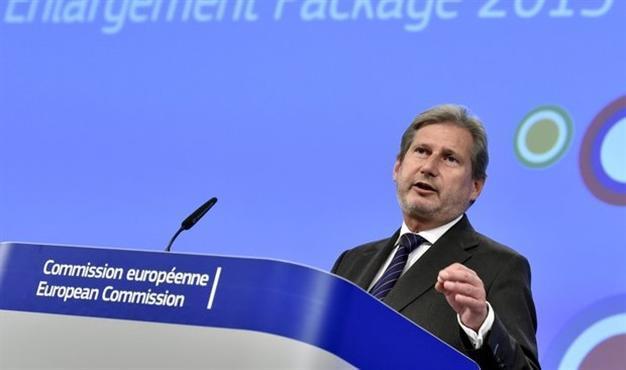Top EU officials to visit Ankara after progress reports slams Turkey
ANKARA

REUTERS photo
Top EU officials are set to pay a visit to the Turkish capital of Ankara for talks expected to focus on the refugee crisis shortly after the release of a progress report in which the EU’s executive body accused the full membership candidate of backsliding on the rule of law, rights and the media, while calling on the new government to take urgent action.
The scathing report on Ankara’s EU candidacy, originally due for release before the vote that returned the Justice and Development Party (AKP) to power, praised Turkey for housing Syrian refugees and for cooperating on the migration crisis.
However, it was also severely critical of the domestic situation in Turkey, saying there had been “serious backsliding” on freedom of expression and the judiciary had been undermined.
“After the elections, we will now discuss different issues,” the EU Commissioner for European Neighborhood Policy and Enlargement Negotiations Johannes Hahn said at a press conference in Brussels, as he presented the enlargement package on Nov. 10.
During the press conference’s live transmission Hahn said he and European Commission Vice President Frans Timmermans were due to fly to Turkey immediately following the press conference.
Preparations to open Turkey’s accession talks with the EU on Chapter 17 covering economic and monetary policy were almost completed, Hahn said.
Recalling that out of the 35 chapters Turkey must conclude as part of its accession negotiations, Greek Cyprus, which officially represents the entire divided island, has blocked six, Hahn said. Chapter 23 on the judiciary and fundamental rights and Chapter 24 on justice, freedom and security were among those six chapters.
“Positive outcomes of talks on Cyprus might coincide with Chapter 23 and Chapter 24 preparations. This might ease the situation on opening these chapters,” Hahn said, referring to the U.N.-led talks to resolve the decades-long Cyprus conflict.
The report emphasized an overall negative trend in the respect for the rule of law and fundamental rights in Turkey, according to a summary of the report’s key findings by the European Commission, the EU’s powerful executive arm.
Turkey’s commitment to joining the 28-nation bloc was “offset” by domestic actions that “ran against European standards,” it added.
“The new government formed after the repeat election on Nov. 1 will need to address these urgent priorities,” the summary said.
The report highlighted criminal cases against journalists and writers, intimidation of media outlets and changes to Internet law.
“After several years of progress on freedom of expression, serious backsliding was seen over the past two years,” it said.
It added that the “independence of the judiciary and the principle of separation of powers have been undermined since 2014 and judges and prosecutors have been under strong political pressure.”
Turkey had meanwhile seen a “severe deterioration of its security situation.”
The harsh report had been expected to be released in October but was held back until after the Nov. 1 elections, in which the AKP stormed back to a majority.
Its release comes just over a month after the EU announced a refugee cooperation deal with Turkey, the main launching point for migrants coming to Europe, including a possible three billion euros ($3.3 billion) in aid.
The deal included pushing Turkey’s long-stalled accession process forward and speeding up visa liberalization for Turks travelling to the EU.
Turkey applied for EU membership in 1987 and accession talks began in 2005, but Ankara has since completed just one of the chapters needed to join the bloc.
